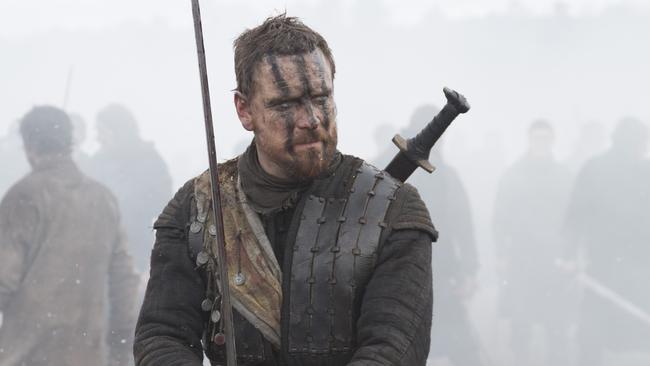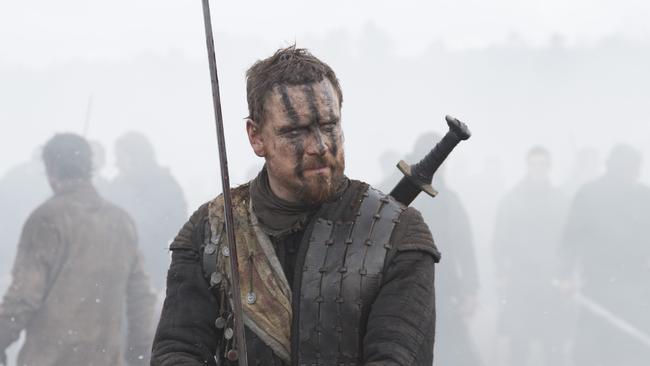Shakespeare’s bloody drama twists truth about the real king Macbeth
Shakespeare’s Macbeth has entertained audiences for 400 years, but the tale of bloody regicide bears little resemblance to the life of the real Scottish king of almost 1000 years ago.

Today in History
Don't miss out on the headlines from Today in History. Followed categories will be added to My News.
In the dark tragedy of Shakespeare’s Macbeth the maligned medieval Scottish king and his queen Gruoch can claim the deepest wounds. For 400 years audiences have watched witches torture the ambitious Macbeth, who slew the elderly good king Malcolm while he slept, urged on by conniving Lady Macbeth.
Historians argue Shakespeare, as resident playwright of the King’s Players, was eager to please his patron King James when he executed a dramatic hatchet job on a good and just King Macbeth.
In one inaccuracy, Shakespeare has Macbeth reign for about a year, when he enjoyed a peaceful reign of 17 years.
A new film version of Shakespeare’s bloodstained tragedy, written in 1606 shortly after James VI of Scotland united England and Scotland as James I of England, by Australian director Justin Kurzel, opens in Sydney on Thursday. The play was loosely based on 11th century Scots king, Mac Bethad mac Findlaich, likely drawing on inaccurate biographical details published in Holinshed’s Chronicles (Macbeth) in 1577, based on Hector Boece’s inaccurate Scotorum Historiae, published in 1527.
Macbeth and his queen both descended from the first Scots king Kenneth MacAlpin, who united the Gaels and Picts in 834.
Macbeth was born around 1005 at Alba in central Scotland to Finlay, a Mormaer, or earl, of Moray in north-eastern Scotland. His mother was likely Donada, second daughter of Malcolm II, then king of Scotland.
Gruoch was born around 1015 and married Macbeth’s cousin Gillacomgain Mac Maelbrigte, one of two cousins who killed Macbeth’s father in a bloody intrafamilial war for power in Moray.
Gillacomgain was burnt to death in 1032, a killing sometimes blamed on Macbeth. Gruoch, a widow with a fatherless son Lulach, made a political union with Macbeth.
Malcolm II died of natural causes on November 24, 1034, succeeded one month later by his son, Duncan. An unstable six-year rule was marred by Duncan I’s thirst for power and incompetence on the battlefield.
Duncan’s forces repelled an attack by Northumbrian earl Ealdred in 1038. Chiefs then urged Duncan to lead a counter-attack.
Duncan also wanted to invade the Orkney Islands to the north. Ignoring objections from advisers, in 1040 Duncan did both, sending his nephew Moddan to lead the Orkneys attack.
Duncan led a force south toward Northumbria. Both armies were soon defeated, with Moddan’s army pursued by Orkney earl Thorfinn. Macbeth joined Thorfinn’s forces to kill Moddan. On August 14, 1040, Macbeth also defeated Duncan’s army at Pitgaveny, killing Duncan I in the process. In Shakespeare’s play, Macbeth admits to murdering Duncan in his bed.
Duncan’s young son Malcolm MacDuncan was sent to England.
Macbeth’s reign delivered peace and prosperity for Scots, as he ruled fairly and encouraged the spread of Christianity. His laws enforced a Celtic tradition requiring court officers to defend women and orphans anywhere in the kingdom, and allowed daughters the same inheritance rights as sons.
Macbeth suppressed a rebellion by Duncan I’s supporters in 1045, while Northumbrian earl Siward, uncle of young Malcolm, mounted an unsuccessful attack against Macbeth in 1046. Macbeth and Gruoch travelled to Rome for a papal jubilee in 1050, giving alms to the poor and donating to the church. As political turmoil brewed outside Scotland, on Macbeth’s return in 1052 Normans fled chaos in England to Scotland, where Celtic custom held that all travellers were welcome in the king’s court.
Macbeth’s generosity irritated English lords, then lobbied by Duncan I’s son Malcolm, aged 21, who boasted that he was best-suited to serve as king of Scotland.

Northumbria’s Siward joined forces with Malcolm to lead an army into Scotland in 1054. Meeting little early resistance, they continued north to clash with Macbeth’s forces at Dunsinnan, near the capital of Scone, on July 27, 1054. Macbeth lost 3000 men in the battle, which cost the invaders 1500 men. Macbeth’s army remained near Scone while Malcolm controlled Cumbria in Scotland’s south.
Over the next three years Macbeth staved off constant assaults by Malcolm’s armies. Macbeth lost support from two key allies, Pope Leo IX and the bishop of St Andrew in 1057. His chief general, Orkney ruler Thorfinn, had also recently died.
Malcolm’s men killed Macbeth at the Battle of Lumphanan in Aberdeenshire on August 15, 1057. His body was buried on the isle of Iona, traditional burial ground of Scottish kings. His stepson Lulach was elected high king days later but ruled for only seven months before he was killed by Malcolm’s agents. Malcolm MacDuncan became king of Scotland on April 25, 1058.
Originally published as Shakespeare’s bloody drama twists truth about the real king Macbeth


